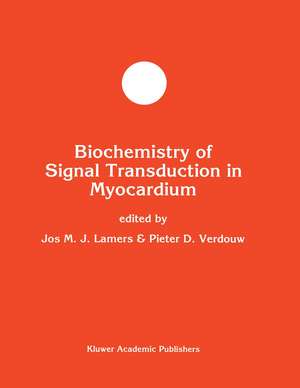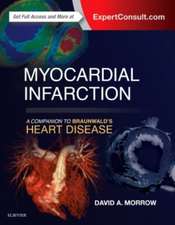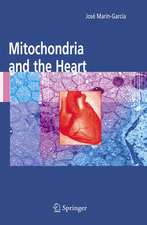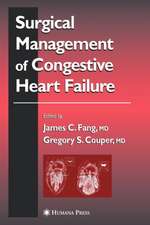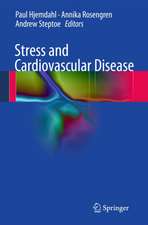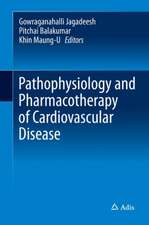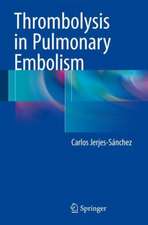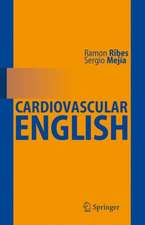Biochemistry of Signal Transduction in Myocardium: Developments in Molecular and Cellular Biochemistry, cartea 17
Editat de Jos M. J. Lamers, Pieter D. Verdouwen Limba Engleză Hardback – 30 iun 1996
Diverse and distinct auto-, para-, and endocrine stimuli arriving at the surface of endothelium, smooth muscle cells, cardiomyocytes and fibroblasts within the myocardium, engage cell type-specific receptors, which lead to transmission of signals across the cell plasma membrane and result in the production and activation of second messengers. The most common mechanism by which these second messengers function is via direct or indirect activation of specific protein kinases. The current challenge for scientists is to identify the specific substrates (e.g. metabolic enzymes, Ca2+-regulating proteins, transcription and mitotic factors) for the many protein kinases, to elucidate the biological significance of the cell type-specific expression heterogeneity of signalling proteins (e.g. membrane receptors, isoenzymes of protein kinase C, G-proteins) and to unravel the cross-talk interaction between the signalling systems (e.g. phospholipase C with adenylate cyclase and phospholipase C with phospholipase D). The multiplicity of receptor types, G-proteins, effector proteins, second messengers and protein kinases, their substrate proteins and the `cross-talk' interactions in the myocardium raises fundamental questions about the mechanisms that ensure the precision and timing of the myocardial responses to hormonal and pharmacological stimuli.
This book provides an up-to-date source of information for all scientists and clinicians interested in the mechanisms by which external signals are transmitted to the interior and regulation of a variety of physiological, pathological and pharmacological responses.
Din seria Developments in Molecular and Cellular Biochemistry
- 5%
 Preț: 389.20 lei
Preț: 389.20 lei - 24%
 Preț: 1057.00 lei
Preț: 1057.00 lei - 18%
 Preț: 1223.70 lei
Preț: 1223.70 lei - 24%
 Preț: 1060.06 lei
Preț: 1060.06 lei -
 Preț: 404.29 lei
Preț: 404.29 lei - 5%
 Preț: 371.30 lei
Preț: 371.30 lei - 18%
 Preț: 1822.40 lei
Preț: 1822.40 lei - 5%
 Preț: 734.57 lei
Preț: 734.57 lei - 24%
 Preț: 1580.12 lei
Preț: 1580.12 lei - 24%
 Preț: 1584.06 lei
Preț: 1584.06 lei - 5%
 Preț: 365.61 lei
Preț: 365.61 lei - 24%
 Preț: 1564.10 lei
Preț: 1564.10 lei - 24%
 Preț: 1077.73 lei
Preț: 1077.73 lei - 15%
 Preț: 582.59 lei
Preț: 582.59 lei - 24%
 Preț: 1583.84 lei
Preț: 1583.84 lei - 5%
 Preț: 671.23 lei
Preț: 671.23 lei - 18%
 Preț: 1222.62 lei
Preț: 1222.62 lei - 24%
 Preț: 801.40 lei
Preț: 801.40 lei - 24%
 Preț: 1098.59 lei
Preț: 1098.59 lei - 18%
 Preț: 940.09 lei
Preț: 940.09 lei - 24%
 Preț: 1060.12 lei
Preț: 1060.12 lei - 5%
 Preț: 1003.87 lei
Preț: 1003.87 lei - 18%
 Preț: 935.67 lei
Preț: 935.67 lei - 5%
 Preț: 1418.48 lei
Preț: 1418.48 lei - 24%
 Preț: 795.21 lei
Preț: 795.21 lei - 18%
 Preț: 1214.07 lei
Preț: 1214.07 lei - 15%
 Preț: 643.00 lei
Preț: 643.00 lei - 24%
 Preț: 808.12 lei
Preț: 808.12 lei - 18%
 Preț: 951.29 lei
Preț: 951.29 lei
Preț: 1568.15 lei
Preț vechi: 2063.37 lei
-24% Nou
Puncte Express: 2352
Preț estimativ în valută:
300.16€ • 326.15$ • 252.30£
300.16€ • 326.15$ • 252.30£
Carte tipărită la comandă
Livrare economică 16-22 aprilie
Preluare comenzi: 021 569.72.76
Specificații
ISBN-13: 9780792340676
ISBN-10: 0792340671
Pagini: 274
Ilustrații: VI, 274 p.
Dimensiuni: 210 x 280 x 23 mm
Greutate: 0.89 kg
Ediția:Reprinted from MOLECULAR AND CELLULAR BIOCHEMISTRY 157:1-2, 1996
Editura: Springer Us
Colecția Springer
Seria Developments in Molecular and Cellular Biochemistry
Locul publicării:New York, NY, United States
ISBN-10: 0792340671
Pagini: 274
Ilustrații: VI, 274 p.
Dimensiuni: 210 x 280 x 23 mm
Greutate: 0.89 kg
Ediția:Reprinted from MOLECULAR AND CELLULAR BIOCHEMISTRY 157:1-2, 1996
Editura: Springer Us
Colecția Springer
Seria Developments in Molecular and Cellular Biochemistry
Locul publicării:New York, NY, United States
Public țintă
ResearchCuprins
I: Basic mechanisms.- Phosphoinositide-generated messengers in cardiac signal transduction.- Angiotensin II signalling pathways in cardiac fibroblasts: Conventional versus novel mechanisms in mediating cardiac growth and function.- Signalling by cGMP-dependent protein kinases.- Regulation of G protein function: Implications for heart disease.- Regulation and functional significance of phospholipase D in myocardium.- Mitogen-activated protein kinase (MAPK) in cardiac tissues.- Phosphotransfer reactions as a means of G protein activation.- Signalling by protein kinase C isoforms in the heart.- II: (Patho)physiological responses in myocardium.- Nitric oxide — a retrograde messenger for carbon monoxide signaling in ischemic heart.- Expression of cardiac muscle markers in rat myocyte cell lines.- Regulation of cardiac gap junction channel permeability and conductance by several phosphorylating conditions.- The transphosphatidylation activity of phospholipase D.- Reduction in Gh protein expression is associated with cytodifferentation of vascular smooth muscle cells.- Coordinated expression of heme oxygenase-1 and ubiquitin in the porcine heart subjected to ischemia and reperfusion.- Sympathetic control of cardiac myosin heavy chain gene expression.- Regulation of expression of cardiac sarcoplasmic reticulum proteins under pathophysiological conditions.- Expression and regulation of chloride channels in neonatal rat cardiomyocytes.- Paracrine functions of the coronary vascular endothelium.- III: Normal and failing myocardium.- Mechanical effects of ET-1 in cardiomyocytes isolated from normal and heart-failed rabbits.- Comparison of calcium-current in isolated atrial myocytes from failing and nonfailing human hearts.- G-proteins and adenylyl cyclase signalling inhypertension.- Protein phosphorylation in isolated trabeculae from nonfailing and failing human hearts.- Regulation of expression of contractile proteins with cardiac hypertrophy and failure.- ?-Adrenoceptor mediated signal transduction in congestive heart failure in cardiomyopathy (UM-X7.1) hamsters.- IV: Cardiovascular therapeutics.- Polyunsaturated fatty acids and signalling via phospholipase C-? and A2 in myocardium.- Local renin-angiotensin systems.- Metabolism of linoleic and ?-linolenic acids in cultured cardiomyocytes: Effect of different N-6 and N-3 fatty acid supplementation.- Alpha-tocopherol pretreatment improves endothelium-dependent vasodilation in aortic strips of young and aging rats exposed to oxidative stress.- Inositolpolyphosphates and their binding proteins — a short review.- Prevention of late lumen loss after coronary angioplasty by photodynamic therapy: Role of activated neutrophils.- Alpha-adrenergic reactivity of the microcirculation in conscious spontaneously hypertensive rats.- Phosphodiesterase inhibition and Ca2+ sensitization.- Adrenergic and muscarinic receptor regulation and therapeutic implications in heart failure.- Endothelin and endothelin antagonists: Potential role in cardiovascular and renal disease.- Index to Volume 157.
